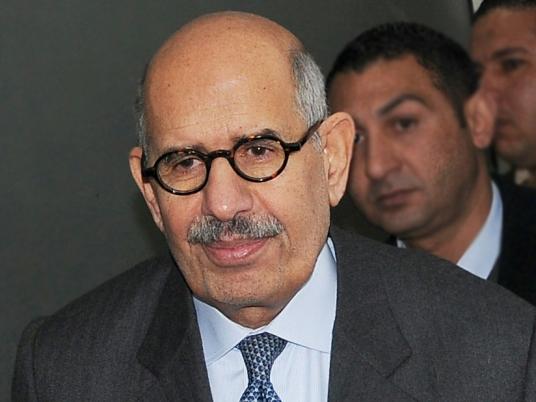Would-be presidential candidate Mohamed ElBaradei is traveling to the US next week for an extended visit that could present some interesting dynamics in terms of his campaign to rewrite the rules of Egypt’s political game.
ElBaradei’s US itinerary is still not entirely clear. Efforts to contact his local representatives for clarification were unsuccessful.
At the very least, he is scheduled to deliver a speech at Harvard University’s John F. Kennedy School of Government on 27 April. Beyond that, ElBaradei’s exact movements remain subject to speculation and conjecture.
Safei Eldin Hamed, former president of the Egyptian-American Alliance, said he had heard ElBaradei would also be speaking at Boston’s Tufts University. Ahmed Sonbol, a young Egypt-born computer engineer based in Boston, said the local Egyptian community was trying to arrange a meeting with ElBaradei early next week. If the meeting materializes, Sonbol said in an email, “a big turnout is expected.”
ElBaradei’s US tour comes at a critical time for his campaign aimed at sweeping democratic reform. Members of his organization say their drive to collect signatures in support of ElBaradei’s cause will begin in earnest at the end of the month. The signature campaign seeks to show that ElBaradei’s reform demands–which include the amendment of three articles of Egypt’s constitution–are backed by a massive popular mandate.
The former International Atomic Energy Agency chief’s visit to America raises a number of questions:
Will he speak to the US media?
ElBaradei is currently the subject of intense fascination in US media and government circles. Every day seems to produce a new news article on his campaign, and the Washington Post, Newsweek and the New Yorker have all recently weighed in on the phenomenon. ElBaradei will therefore have his pick of prominent newspapers and television programs for an extended interview.
And if he really wants to annoy the Egyptian regime, he can sit down with Charlie Rose–President Hosni Mubarak’s interviewer-of-choice during visits to the US.
Will he meet with Obama administration officials?
So far, this seems unlikely. ElBaradei and the US government have publicly kept a polite distance from one other for several months. It appears both sides want it that way.
The Americans don’t want to anger their ally, the Egyptian government, by openly endorsing ElBaradei’s cause. And ElBaradei–who regularly fends off criticism for being “too foreign” and for not having done enough to prevent the US-led invasion of Iraq–wouldn’t want to jeopardize his Egyptian street credibility, or open himself up to charges of being an American puppet.
Since his return to Egypt last February, ElBaradei has kept public contacts with US officials limited and polite. Most notably, he sat next to US Ambassador to Egypt Margaret Scobey earlier this month during celebrations marking Coptic Easter.
Will he rally support from Egyptian-Americans? And if so, how will he be received?
To a large extent, ElBaradei’s criticisms of Egypt and frustrations with the state of local democracy mirror those of many longtime Egyptian expatriates. One of the main platforms of his campaign is to establish the right of Egyptians overseas to vote in presidential elections.
“His campaign coincides with many of our hopes and agendas,” said Hamed. “There is an overwhelming enthusiasm for him.”
But ElBaradei will have to tread carefully in his dealings with the Egyptian-American community. One of his biggest challenges will be to inspire hope in a community where many view the notion of political change in Egypt as an unrealistic fantasy.
“I have my doubts,” said Sherine El-Abd, a prominent political organizer in New Jersey–the unofficial capital of Egyptian-America. “I don’t believe that it’s real. I don’t believe he’s a real candidate. But there are a lot of Egyptian-Americans here who do believe in him.”
El-Abd, board member of the Arab-American Institute and president of the New Jersey Federation of Republican Women, is a self-described “political cynic” who admits her views are “probably in the minority” among her fellow Egyptian-Americans.
While agreeing with much of ElBaradei’s platform, she simply doesn’t believe he will be able to garner enough popular support to genuinely change the system.
“Obviously, people want democracy in Egypt and don’t believe that having the same president for 30 years represents democracy,” El-Abd said. “But [ElBaradei] is someone who hasn’t lived in Egypt for many years, so I’m not sure how much support he will receive internally.”
“Even if a candidate is fantastic, if I don’t feel it’s realistic, I have to save my energy for other causes,” she added.
EgyptFeatures/Interviews



